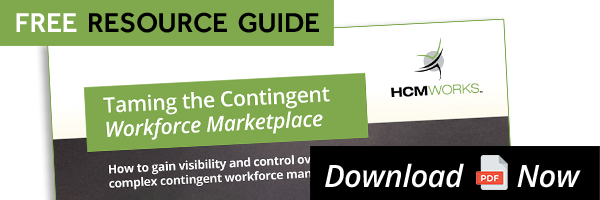When procurement departments first got involved with managing an increasingly growing contingent workforce, they were often tasked by executive teams to reduce costs.
The initial premise was that procuring people, with specific skills and intellectual capital, was not unlike procuring any other needed resource. Procurement traditionally concentrated on cost, risk, and measurement, and this competency was extended to staffing contingent workers.
With the advent of cloud-based Vendor Management System (VMS) technologies, procurement departments began obtaining better reporting. Qualitative information (staffing provider, contractor performance, compliance) and quantitative data (hours, positions, costs) could be reported to executives, hiring managers, HR and accounting.
The result? There was now increased visibility into the management of contingent labor.
Although VMS technologies eliminated vast amounts of paperwork and manual processing, it didn’t take long for both technology providers, and clients, to recognize that the technology by itself was not a complete solution. There were still challenges with managing the complex multi-party relationships, and organizing the internal change-management needed to achieve sustainable performance objectives.
Companies turned to staffing providers to optimize the use of their VMS, but they weren't always vendor neutral
In response to the new requirement, many staffing providers started offering services, as a Managed Service Provider (MSP). They purchased or developed their own VMS technology tools and, as part of a new service offering, offered to centralize all contingent workers under one program and have them sourced and managed by themselves - a single point of contact for the client.
Such a model differs from the traditional Master Vendor Model as, officially, the MSP was there only to administer the program without actively recruiting for the available positions and making any staffing placements.
However, since many of the companies who offered this type of MSP service were themselves staffing providers, it was difficult to keep tabs on whether the managed services provider actually favoured themselves or certain staffing firms over others at the expense of the client.
This resulted in the creation of the “vendor and technology neutral MSP model”, in which the MSP provider has no links to any staffing firm whatsoever, and can focus solely on putting the customer’s best interests first. So, what exactly are the disadvantages of a non-neutral MSP model, and why should your organization work with a vendor neutral MSP? HCMWorks answers all of your questions in this blog.
What are the disadvantages of a non-neutral MSP model?
1 - Potential conflict of interest
On occasion non-neutral MSPs may aim to drive as much spend as possible towards their own/affiliated or partnered staffing services providers. The primary motivation for this is the considerable revenue potential to be derived through staffing vs being the managed services provider. Even if the client has a high degree of visibility into their supplier base, it’s very difficult to determine whether your MSP has been directing requisitions (and thus spend) to their network, because the majority of large MSPs own, or are in partnership with, dozens of smaller firms.
Be careful of the managed services provider which includes their parent company’s staffing entity in the list of Tier 1 providers with first opportunity to source requisitions. This should be a Red flag.
Why is all this disadvantageous to the client? When sourcing isn’t competitive (or even collusive), staffing rates will be considerably higher. In addition, the quality of resources is likely to be poorer without access to a large competitive resource pool.
2 - Vendor management and compliance
Initially, staffing vendors are not particularly happy about their client’s decision to put an MSP program in place. Why? Because it forced them to be more competitive and accountable. Add a non-neutral managed services provider to that equation and the vendors will find further reasons to not perform or be fully compliant.
Conversely, if the MSP provider is recognized as being truly vendor neutral, staffing vendors will be much more inclined to participate actively - recognizing that they have a real unobstructed opportunity to compete and gain market share.
Why do we see so many non-neutral MSP’s being awarded managed services mandates?
This begs the question, why do we then see so many non-neutral managed services providers working on behalf of organizations? There are a few reasons for this, and we've listed just a few of the top ones here:
- Some clients actually prefer having this arrangement as it gives them the best of both worlds (Master Vendor + MSP), especially when dealing with high volume or high turnover positions, where the client simply needs boots on the ground.
- Most of the largest MSPs are large multinational companies with extensive staffing solutions. It appears less “risky” to transition to the MSP services of a well known supplier that the client is familiar with, and who is familiar with their business.
- Often the client does not realize to what extent MSP vendor neutrality is important until after the fact, at which point they are already committed.
So, what are the benefits of using a truly vendor neutral MSP
1. A holistic market approach.
Using their deep domain knowledge of professional services and staffing procurement, along with the best technologies required to manage those services, the neutral MSP applies best practices to build their client an optimal MSP program based on their specific requirements.
For example, before recommending suppliers, the neutral MSP would investigate the customer’s complete spend footprint and analyze what areas they would require additional support from staffing vendors. The vendor neutral MSP does not seek to replace suppliers with their own.
Instead, when needed, they’ll opt to recommend suppliers based on strength and core competencies as opposed to relationships. Instead of insisting on using a specific vendor, a neutral MSP would develop a business requirements document, conduct an RFP, coordinate the required meetings, and use market research / proprietary information to recommend the right vendor mix for the client.
2. Greater ongoing savings
The objective visibility afforded by a neutral MSP and through the VMS technology they use to manage the program, enables clients to leverage and eliminate the often substantial price difference between suppliers providing the same services.
The neutral MSP will ensure the enforcement of a geography-specific rate card, longevity rate reductions, and caps on supplier markups and other policies, will further help reduce costs.
Likewise, demand management, is another major opportunity to drive savings. It is something that only a truly neutral MSP will control, because their interest is based on their clients’ satisfaction, not maximizing spend direct to them, or their subsidiaries.
3. A competitive and visible process
Neutral MSPs ensure that the entire procure-to-pay process is customized to the client’s needs and automated. They provide complete visibility to their clients, including their own profit levels. They also ensure every requisition is sourced, and drive maximum savings through the competitive bidding environment within the VMS tool.
With no contractor base of their own, a neutral MSP will never have a conflict of interest, and always strives to place the best candidate - not the one that will increase their own profit.
With no subsidiaries, the recommended suppliers and preferred provider programs are designed with your best interests in mind. Working with a vendor neutral MSP squares the circle about how to manage a growing contingent workforce, by providing a strategic solution specifically for your organization, your goals, and geared for your success.
Want to learn more? Contact HCMWorks today. Our innovative MSP model has no ties to any staffing vendors, alternative service providers or technology firms. Our team of contingent workforce management experts would love to answer any questions you have.




